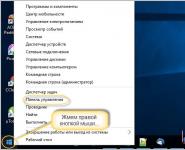Office programs for linux. Compatibility of Linux office suites with Microsoft Office
Questions and answers
Please see the answers to the most frequently asked questions.
If you don't find the answer to your question, please contact our support team.
What is MyOffice?
MyOffice is a platform consisting of a set of office applications for joint editing and storage of documents, a mail system, a corporate messenger for all popular operating systems and mobile platforms: Windows starting from Windows XP, Linux, Android, iOS, Tizen.
Applications within the MyOffice platform: Documents, Text, Spreadsheet, Presentation, Mail, Calendar, Contacts, Storage and Logos.
What is the advantage of MyOffice products?
Key features of our product is:
the ability to work together in real time;
the ability to deploy the platform in both private and public clouds;
unified display of documents on all platforms;
work on all popular platforms, including mobile (Android, iOS, Tizen);
support for operating systems included in the register of domestic software, such as Astra Linux and Alt Linux;
certificates of conformity FSTEK and FSB.
How to buy MyOffice products?
1. Deploy the MyOffice platform on your own servers or on the servers of your partners.
2. Buy MyOffice applications for Windows and Linux workstations from .
3. Purchase access to MyOffice applications on a subscription model (SaaS) from .
4. Download free apps for mobile devices possible in .
Are there special conditions for educational organizations?
What is the free MyOffice Education product?
This is a new product designed for use in educational organizations. It was developed on the basis of MyOffice Standard and is primarily aimed at schools. The products will be delivered to educational organizations (state comprehensive schools) free of charge.
Can I buy MyOffice products directly from you?
MyOffice products are distributed exclusively through the Partner Network.
What types and levels of cooperation are presented in the Affiliate Program?
We strive to make our Affiliate Program the most effective and attractive. At the moment we offer the following options cooperation:
- Reseller
-Integrator
- OEM partner
- Service provider
More details can be found in the section.
Can I learn more about the Affiliate Program and its conditions?
All relationships with partners are built through distributors who take on the operational activities of selling MyOffice products and are responsible for organizing and supporting deliveries to partners. Details affiliate program are available after completing the registration procedure and fulfilling a number of legal conditions.
What kind system requirements to work with products?
For workstation
Computer and processor: 32-bit or 64-bit processor with clock frequency from 1 GHz and support for the SSE2 instruction set.
RAM: 2 GB.
Required disk space: 3.0 GB.
Display: 1024 x 768 screen resolution.
Supported operating systems: Windows XP, Windows 7, Windows 8, Windows 10, Astra Linux Special edition version Smolensk, Alt Linux, macOS, OS X (El Capitan).
Supported Browsers: Google Chrome, Internet Explorer, Microsoft Edge, Mozilla Firefox, Safari, Satellite.
For the server
Minimum configuration HDD: 500GB, RAM: 20, CORE: 10.
Recommended HDD configuration: 2.6 TB, RAM: 96, CORE: 42.
What file formats do your products support?
MyOffice applications work correctly with documents in DOC/DOCX, XLS/XLSX, PPT/PPTX, RTF, TXT, ODT, ODS, ODP formats and support saving to PDF format.
Do you use encryption of communication channels?
Yes, MyOffice uses encryption of communication channels. It is now TLS 1.2 using the most common and strong cryptographic algorithms supported by most modern browsers.
Do you have an electronic signature?
Currently being implemented in various MyOffice Support products electronic signature and encryption like mail messages and office documents. Technologically, MyOffice products work with the most common certified tool cryptographic information(SKZI) on Russian market, manufactured by CryptoPro. Software products can also be modified to work with any other certified CIPF in accordance with the needs of the customer.
How secure is your solution in terms of data storage?
MyOffice platform products were originally designed to work in a corporate environment with the highest security requirements, which is confirmed by an external audit of the system and received FSTEC and FSB certificates. In addition, the platform provides role-based data access control and logging of user operations.
The system architecture is designed and implemented in such a way that there is no single point of failure, including 3-fold redundancy in terms of data storage.
MyOffice provides the opportunity to deploy the server part of the solution both in the public cloud and in the closed loop of the customer or the partner chosen by him - so the information will not leave the organization.
Ever since people started using Linux, usage questions Microsoft office on the platform were very popular and widespread, and new users were puzzled as to how they could get this popular office suite for themselves. After all, acquaintances programs, are an important factor for every person.
Over the years, many different ways make Microsoft Office work. In this article, we will look at the easiest way on how to install Microsoft Office on your Linux machine.
By the way, we already talked about that earlier. A very useful article for those who like to play games. What’s more, it’s all very easy and simple. You can go to the link above.
Installing Microsoft Office Linux: Download the installer
Microsoft Office 2013 is what this guide will focus on. This is because Office 2016 does not work correctly with Wine. Go to the official website of the company and do account Microsoft (or sign in) and download Office program 2013. Be sure to only download the 32-bit version, even if your system is 64-bit.
Installing PlayOnLinux
Using the Wine tools to work with Windows programs is not a complicated process. With enough effort and Wine mastering, anyone can run a Windows program on Linux. Although for many new Linux users Wine can be tedious and annoying to use without any direction.
This is where PlayOnLinux comes in. This is the "Wine Shell" which makes things easier. Basically it is a tool that uses basic technology Wine and adds some easy to use tools GUI to install many games on Windows base and even programs (for example, MS Office).
Means PlayOnLinux available in most modern repositories Linux distributions. Install it by opening the package manager or repository software and searching for "playonlinux" or from a terminal (on Ubuntu):
sudo apt install playonlinux
Using PlayOnLinux to Install Microsoft Office

There are many different buttons and options inside PlayOnLinux. The only thing that matters on this moment, this is the button Install". After you click it, the next window follows with a search field. Type "Microsoft Office" in the search area.
Searching for this term leads to several Microsoft versions office. Each result is a setup profile, and as soon as the user clicks on it, PlayOnLinux creates a Wine environment and goes through the installation process.
In the results, select "Microsoft Office 2013" and then the " Install". Below is a warning that "this program is currently being tested". This means that the PlayOnLinux profile for Office 2013 is under testing and may experience some hiccups. Click OK to continue.

This brings up the Windows Setup Wizard. Read the instructions and select the " Further" to move on to the next part of the installer. PlayOnLinux asks the user to provide an installation file.

Provide the installer from where it was downloaded earlier in the tutorial, or click "Use DVD-ROM(s)" and install MS Office 2013 instead.
Once the installation process starts, PlayOnLinux will set up the contained Wine environment and host Microsoft Office inside of it. From here, Microsoft Office will be accessible from the Linux desktop.
Known issues and bugs with Office 2013
Installing Microsoft Office Linux is very easy, but sometimes Office 2013 may not install. This is because the 64-bit version does not work. Office 2013 requires the 32-bit version to work with Linux and Wine.
In addition, the Office installer may not work with PlayOnLinux and may even fail. This is not necessarily an Office installer error and is most likely a script issue PlayOnLinux Office 2013, which is installed by the program itself. If this happens, it's best to just restart PlayOnLinux and try again.
WineHQ

Installation Windows programs on Linux is never a reliable process. Problems often arise. This is why when using Wine, users should pay attention to WineHQ. This is a website that catalogs hundreds of Windows programs, how they work on Wine, and how users can fix problems that may occur in order for the programs to work properly.
Alternatives

Although Microsoft can work with Linux with using Wine, is not the only way use Office Suite. If you are having trouble running any version of this office suite, there is an alternative.
Microsoft had an alternative for a while Google Docs, known as Office 365. This program isn't perfect or as good as its desktop counterpart. However, if this method Microsoft installations Office failed you, this is another option.
If Office 2013 and 365 didn't work for you on Linux and you're looking for better alternatives, check out Libre Office. It is the famous Linux first alternative to the Microsoft Office suite and it is very difficult for developers to make it familiar and compatible with Microsoft technologies.
Then there's WPS Office, a suite that's designed to look just like Microsoft Office, as well as FreeOffice. Along with all that, here is a list of five free alternatives to Microsoft OneNote( note taking app) and five good alternatives Microsoft outlook.
conclusions
As you understand, installing Microsoft Office Linux is very fast. Of course, sometimes there may be mistakes, but they can be easily dealt with.
Switching to Linux does not mean you have to give up your Windows applications. The existence of Wine (and PlayonLinux) has made it easier to install and use Windows applications (in this case, Microsoft Office 2013). If you don't need any of the proprietary features specific to Microsoft Office, we recommend that you try alternative office suites like LibreOffice as they are quite stable, evolving and capable.
If you have any questions about " Installing Microsoft Office Linux- write about it in the comments. We will definitely read your comment and try to help in your question.
If you find an error, please highlight a piece of text and click Ctrl+Enter.
One of the reasons why some people can't give up Windows is because they get used to the programs they're used to running on their system. You know, I understand them. I'm also used to working with some programs in Linux, and when I find myself in a hostile environment, I feel unarmed, out of the habit.
For Windows Freeware there are a lot of programs for the office, but there are a lot of them for Linux, even more than the average user needs home computer. Here are the ones I use.
sudo apt-get install abiword
This is an analogue of Word and this application is often put in light versions of Linux instead of the powerful libreoffice package.
If you still need spreadsheets, such as Excel, then you can put the program Gnumeric. You can install it with the command:
sudo apt-get install gnumeric
Basic operations can be done in these two applications without installing a huge office suite, most of whose functions are most often simply not needed. What other office programs for Linux can I use?
I really like the Cherry Tree notepad that I wrote about in THIS post. But you can not go to the official site, but install it from:
sudo apt-get install cherrytree

If you have Ubuntu as your main system, but you have not been able to master the Open or Libre Office packages, or cannot work in them for other reasons, then you are probably looking for a way to install the familiar Microsoft Office on this OS. I hasten to please you - there are three ways! More precisely, there are a little more of them, but this article will describe the three most convenient and not similar to each other (the rest, as a rule, are special cases of these). Let's start with the simplest.
Method one: online office
Actually, you can’t call it an installation, but this way the easiest and most convenient (provided that you have the Internet). The official set of Microsoft Office, and absolutely free, is available at https://www.office.com/. All that is required of you is to follow this link and start using the full package. Moreover, you can edit documents or tables together with someone. And for more convenient access, you can install shortcuts using the "Linux Web Apps" installer for quick launch application data.
The advantage of this approach is that you will have access to the most latest version office, and from any computer. Also, you will not need to download various installers, configure Wine, etc.
The only disadvantage of this approach is the inability to use the package without an Internet connection (moreover, access must be stable and at least 1 Mbps, for more or less comfortable work).
Method Two: PlayOnLinux
This method will already require some body movements and some preparation from you. First, you must have downloaded the Office 2010 or 2007 package, and it must be official, clean, without service packs. Also, you must have access to the Internet (this is only during the installation, then the Internet will not be needed).
So, first we install the PlayOnLinux package. To do this, enter the following commands in the terminal:
- wget -q "http://deb.playonlinux.com/public.gpg" -O- | sudo apt-key add - sudo wget http://deb.playonlinux.com/playonlinux_trusty .list -O /etc/apt/sources.list.d/playonlinux.list
- sudo apt-get update
- sudo apt-get install playonlinux
That's it, now the PlayOnLinux program is installed on your system and you can start installing the office package.
We launch the program (from a shortcut or write in the playonlinux terminal) Click “Next” several times in the initial setup wizard. Now we see the main window of the program. Go to the Office tab and select Microsoft Office 2010 or 2007 and click Install. We are waiting for the program to prepare the environment for installation. Next, you will see a window where you can specify the Microsoft Office installation source - you can specify as iso image, and .exe file. Well, that's all, then we install the office the way you would do it in Windows. After the installation is completed, you will have a full-fledged office on Linux.
It is also worth noting that in addition to the office, you can install other programs and games that are available in the main program window. Their installation is almost identical to the installation of the office, except that there may be some differences.
Of the pluses, it is worth noting that now you can open Microsoft Office files by double-clicking, and a full-fledged office will be installed on your system. But there are also disadvantages - it will be quite problematic to update it, and various errors can often appear, besides, it is not yet possible to install an office in 2013, but in general this option has the right to life.
Method three: virtual machine
We will use VirtualBox as a virtual machine. it software for virtualization of almost any operating system. Here is a short list of its features:
- Cross-platform;
- Modularity;
- USB 2.0 support;
- Support for 64-bit guest systems, even if the main system is 32-bit;
- SMP support in the guest system;
- Built-in RDP server;
- Support for hardware 3V acceleration;
- Support for hard drive images;
- Support for audio device virtualization;
- Support for networking;
- Shared Folders support for simple exchange files between the host and guest systems (for guest Windows systems 2000 and newer, Linux and Solaris);
- Support for desktop integration (seamless mode) host and guest OS;
- Support for OVF/OVA format;
- It is possible to select the interface language (the Russian-language interface is also supported).
That is, your PC will work like a second computer. To install VirtualBox, you can go to the official website of the developer and download the installation package, but you can also get by with the terminal. To do this, enter:
- wget -q http://download.virtualbox.org/virtualbox/debian/oracle_vbox.asc -O- | sudo apt key add-
- sudo sh -c 'echo "deb http://download.virtualbox.org/virtualbox/debian $(lsb_release -sc) contrib" >> /etc/apt/sources.list'
- sudo apt-get update
- sudo apt-get install virtualbox
That's all - the program is installed, now you can run it. But before starting, you need to add your user to a special group:
- sudo usermod -G vboxusers -a UserName
After executing this command, you need to restart your computer. Now we need to download the Oracle VM VirtualBox Extension Pack. go to the official website of the program and in the "Download" section download desired version package. Once it is downloaded, double click on it to install it.
Now, in fact, you can go to Windows installation. Open the program and click on the create button. Enter any name, select the type Microsoft Windows and the version depending on the one you want to install. What follows is intuitive:
After we have a new virtual machine, click on the configure button and go to the media tab. Here we select the image of the system that we want to install (you need to download it in advance). Now we launch virtual machine. Next, just install Windows as usual.
Well, that's all, now you have a full-fledged Windows in which you can install Microsoft Office of any version and work quietly. For more convenient work, you can also install add-ons for the guest OS and "share" several folders in the main OS.
Instead of conclusions
Now you know the whole way to install Microsoft Office on Ubuntu OS. Choose the one closest to you and use it, although no one forbids you to combine all three.


